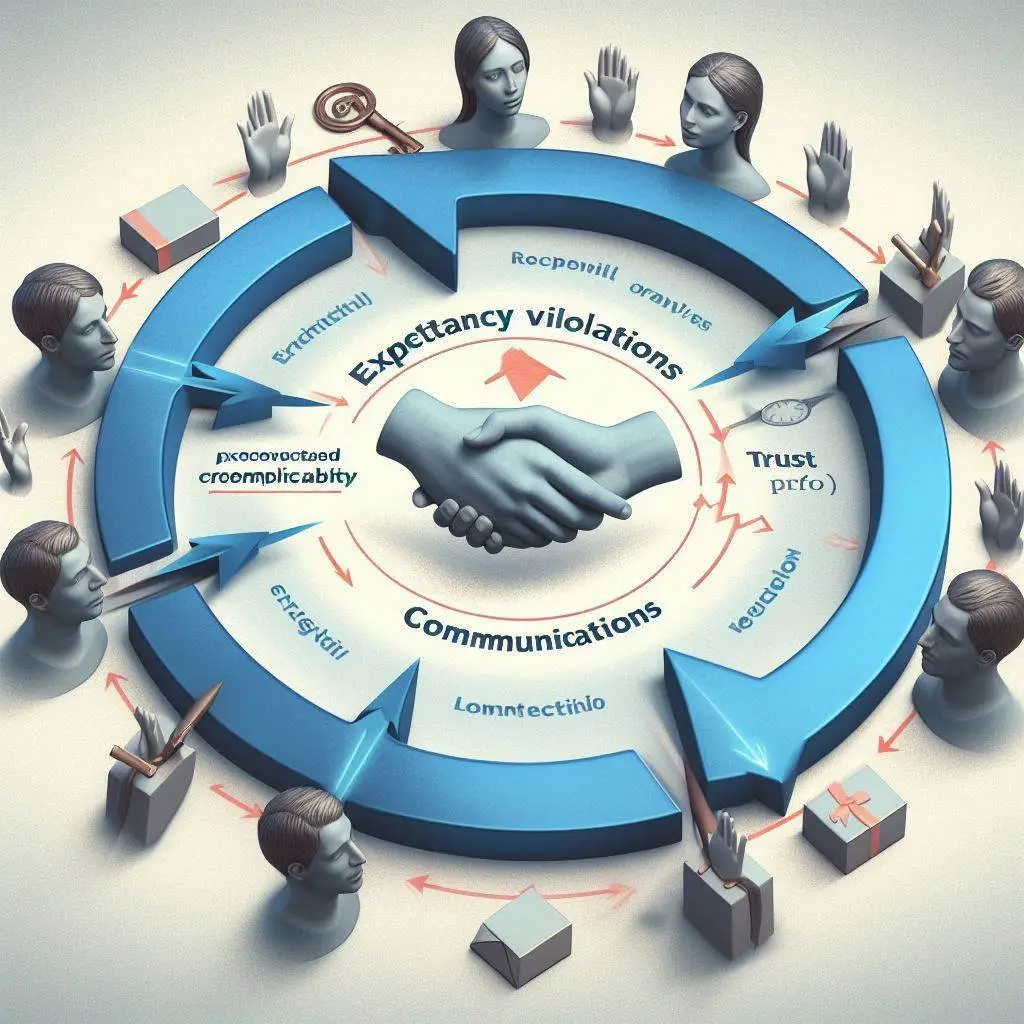
What is Expectancy Violations Theory
The Expectancy Violations Theory is all about how people react when someone breaks the unwritten rules of communication, like through body language or facial expressions. Basically, we all have ideas about how others should behave, and when someone does something unexpected, it can make us see them differently and change how we act around them.
Brief History and Development of the Theory
Expectancy Violations Theory, created by Judee K. Burgoon in the late 1970s, is about how we expect others to act without speaking. It started as the Nonverbal Expectancy Violations Theory. It looked at how breaking these expectations affects things like trust, convincingness, and liking when we talk to each other. Burgoon kept working on the theory, making it clearer. She focused on ideas like what we expect, how we feel when expectations are broken, and how we feel about the person who breaks them.
Key Concepts
Expectancy:
This is about what someone expects to happen in a certain situation. People have ideas about how others should act based on social rules, relationships, and personal traits.
Violation Valence:
This is about how good or bad someone sees a violation of these expectations. When expectations are broken, it can feel either good or bad, depending on how well the people know each other and what exactly happened.
Communicator Reward Valence:
This is about how someone sees the interaction. When expectations are broken, it can be seen as either good or bad. People act differently based on the values they’ve learned from their culture, which also affects how they see these violations.
Application of Expectancy Violations Theory

The Expectancy Violations Theory (EVT) is useful in understanding communication in different areas like relationships, work, and media.
- EVT helps us see how our expectations and when they’re broken affect how we see and act with others. When someone breaks our expectations in a good way, it can be beneficial for relationships.
- At work, EVT helps managers understand and deal with unexpected behaviors. By knowing about EVT, they can handle these situations better, which can improve how people communicate and work together.
- EVT says we expect certain behaviors from others. When these expectations are broken, it can be seen as good or bad depending on the situation and the relationship between people.
- EVT isn’t just for people-to-people communication. It also applies to how we interact with technology. For example, it helps designers know how to create user interfaces that meet or break user expectations.
These examples show how EVT is useful for understanding communication in many different situations, from personal relationships to workplaces and media.
Proxemics and Personal Space

When people feel like someone has invaded their personal space, they usually try to defend it. Edward T. Hall came up with a theory about personal space, which divides it into different areas like intimate distance. This theory helps us understand how crossing these boundaries can affect how people feel and react. Proxemics, the study of how space is used to communicate, is important for understanding how invading personal space can affect how people interact with each other. Expectancy Violations Theory shows that people might see personal space violations as either good or bad, depending on their relationship with the person who did it and how they feel about what happened.
Reward Valence
In Expectancy Violations Theory, the “communicator reward valence” means how we see someone who breaks our expectations and if we think they might give us something good. Sometimes, it’s hard to decide if the surprise is good or bad. When we’re unsure, we look at the person who surprised us to decide how we feel about them. People who seem nice, popular, trustworthy, and maybe able to give us good things are seen as having a positive valence. This part of EVT helps us understand how we judge nonverbal communication, especially when we’re not sure if it’s good or bad.
Strengths and Benefits
Expectancy Violations Theory helps us understand how people react when someone does something unexpected. It’s especially useful for studying how people respond to different types of media. This theory focuses on how surprises affect our feelings and thinking, giving us useful ideas about how communication and human behavior work.
Criticisms and Limitations
Some people think that Expectancy Violations Theory (EVT) has some problems. They say it assumes that when people break social norms, it always leads to big problems and makes communication harder. But studies show that these norm-breaking moments can happen in different ways—sometimes they’re not a big deal, and sometimes they’re even helpful because they give us more information.
Another issue is that EVT thinks we can always predict how people will react when norms are broken, but real-life situations are really complicated, so it’s hard to know for sure how someone will respond every time. Also, EVT focuses a lot on body language, but it doesn’t consider how different cultures and people might see things differently when norms are broken.
Research and Development
Future research and development on Expectancy Violations Theory could concentrate on fixing the problems and drawbacks people have found with the theory. This might mean looking more into how often, how serious, and whether the violations are positive or negative, and also how different cultures and individuals see violations. Also, researchers could work on making Expectancy Violations Theory better at predicting what happens in human interactions. Using EVT in new types of communication like online chats and talking to computers could be a cool area for future study. By doing these things, we can make EVT better and use it in more types of communication situations.





